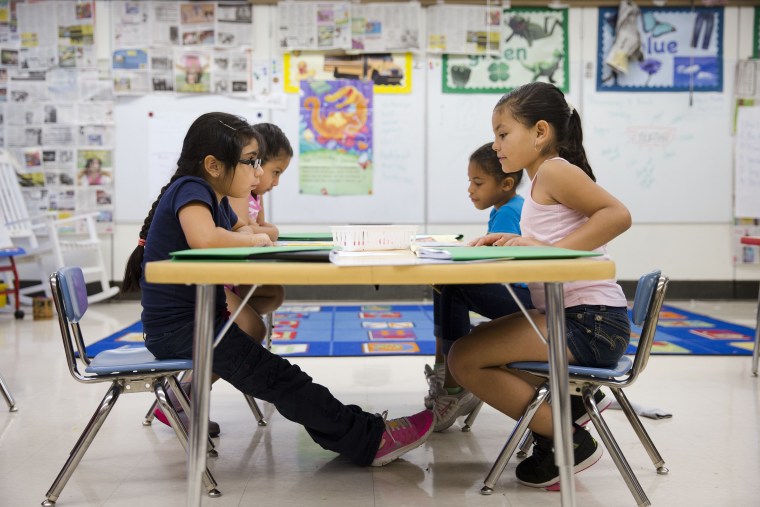AUSTIN, TX -- For Esther Calzada the differences in the parenting styles of her Latino parents and the parents of her non-Latino friends came into clear focus as a young girl, when she was invited for the first time to a sleepover at her friend’s house.
The daughter of Dominican immigrants and raised in Jacksonville, Fla., Calzada asked her parents for permission.
“They looked at me as if I had two heads,” Calzada told NBC News, chuckling at the memory.
As she grew older, like many Latinos, Calzada found humor in conversations with friends about the strict parenting practices which are often the cultural norm in Latino families. Later, attending graduate school, working on her dissertation and with a treatment program for behavioral problems in children, Calzada began looking into the literature and research on parenting. She discovered little was known as it related to Latinos.
A clinical psychologist and a social work professor at the University of Texas at Austin, Calzada was the lead researcher on a new study published in the Journal of Clinical Child & Adolescent Psychology on authoritarian parenting among Latinos. Her research found that such parenting -- defined as strict, controlling, and not responsive to a child’s feelings -- can lead to internalizing behaviors including depression and anxiety in young Mexican American and Dominican American children ages 4 to 6.
"The fact that we’re finding these Latino kids are at five times more risk than their non-Latino peers for anxiety and depression is in my eyes clearly a call for action,” says Univ. of Texas professor and clinical psychologist Esther Calzada.
“What seems to be so obvious in these conversations you might have on a personal level, we don’t see those nuances or culture reflected in our research on how it plays out in our parenting,” Calzada said. “That’s one thing I’m trying to capture.”
RELATED: The traditions I missed – and the ones I gained – as a child of immigrant parents
According to the study, almost 50 percent of children were at risk for anxiety, and 10 percent for depression and somatization, with these rates persisting over time.
“The fact that we’re finding these Latino kids are at five times more risk than their non-Latino peers for anxiety and depression is in my eyes clearly a call for action,” Calzada said. “These are really young kids and the rates are astonishingly high.”
NBC News talked with Calzada about her new research, its implications and why some Latinos are surprised by the findings.
NBC News: Why is it important to study authoritarian parenting and its outcomes?
Calzada: We know that parenting is one of the strongest predictors of how kids end up doing in terms of school and mental health outcomes. We want to understand parenting strategies and what are the ones we want to help parents avoid. In terms of Latino families there is this idea that we’re a very authoritarian culture and certainly that plays out within the family. So there’s been a debate regarding the effects: How can it be a risk factor if it’s culturally normative? Some studies say that it is in fact true that for Latinos authoritarian parenting is not going to contribute to child problem outcomes in academics or mental health. We’re weighing in and saying we definitely need more evidence to say how does authoritarianism play out?
NBC News: What level of authoritarian parenting are we talking about? Is it more than just being strict?
Calzada: What we’re capturing is more than just strict parenting. It’s a combination of strict parenting without the kind of a context of ‘Let me help you understand the reason for my rules’ and ‘Let me help you understand how and why you should be obedient and not question me.’ It’s without that underlying support for the kids to understand why it’s so important and why they should do it.
NBC News: Some Latinos might be surprised to learn that authoritarian parenting and the emphasis on respeto can lead to anxiety in children. What’s been the reaction to your study?
Calzada: There are mixed reactions to that, including my own which is that respect is such a core value for a lot of Latinos and one that by many accounts has served us very well to teach children the importance of obedience and deference and respect for authority. So it’s somewhat surprising to see it would be associated with any negative outcomes. We really want to be careful not to imply that there is something deficient about Latino culture. Certainly that’s not the case. We really are hoping to find what strengths Latino families and those strong cultural ties bring to families and to children’s development.
RELATED: New Poll: The State Of Parenting-Here's a Snapshot
NBC News: Among Latinos and Mexican Americans, it’s common to joke about authoritarian parenting. We have fun reminiscing about our mothers and grandmothers wielding the chancla, for example. But don’t non-Latino parents also practice authoritarian parenting?
Calzada: Absolutely. In terms of something like the chancla,(common word for slipper or flip-flop) it just happens to be our way of spanking. We know based on national surveys and studies that some kind of physical punishment is pretty common and that it is common across (racial and ethnic) groups. I think part of the reason it’s so important to understand more about Latinos is because our kids aren’t doing so well in terms of succeeding in school and developing strong socio-emotional skills, and if we can leverage positive parenting to help kids to do better in school and to avoid these outcomes of anxiety and depression, then that’s critically important. We know based on statistics and studies, Latinos are at high risk for negative outcomes and we need to change that.
